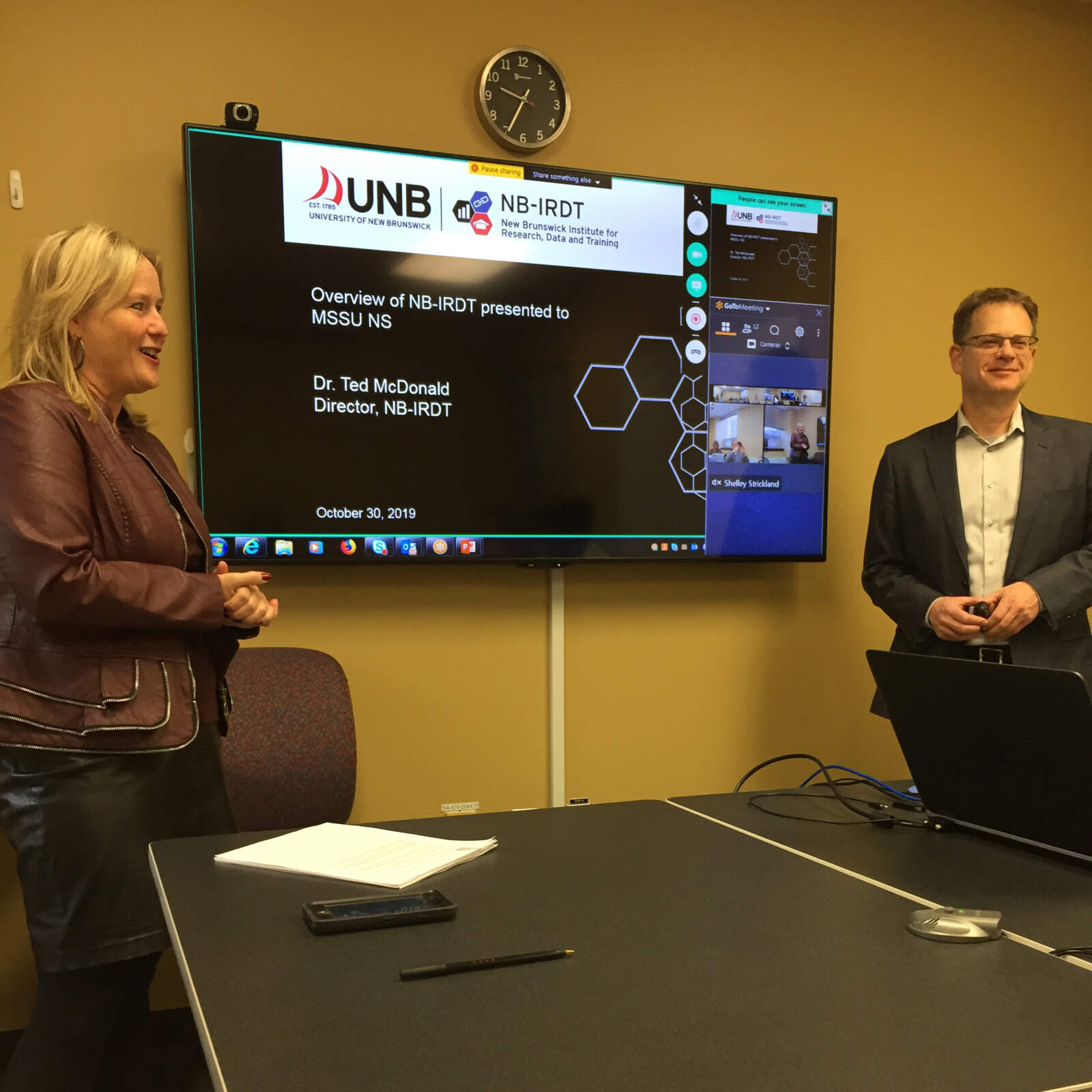
On October 30, 2019, Dr. Ted McDonald, Director of the New Brunswick Institute of Research, Data, and Training (NB-IRDT), gave three presentations to colleagues in Nova Scotia about the NB-IRDT.
Each presentation varied slightly by audience, but all provided an overview of NB-IRDT and the process to develop a legislative framework to support administrative data storage and use in New Brunswick, particularly the introduction of Bill 57 (An Act Respecting Research) and Bill 29 that expanded the scope of Bill 57.
Prior to introducing these bills, data was often isolated within individual government departments and processes for sharing with researchers were inefficient and cumbersome. A multitude of different pieces of legislation dealt with government data in the province. This complex landscape hampered efforts to collaborate on evidence-informed policies—a key motivation for change within the government.
The solution? An omnibus bill, Bill 57, that made it possible for a research data centre to act as a data custodian for government data from multiple sources, and paved the way for efficient sharing of administrative data—not only health-related data. In New Brunswick, the NB-IRDT serves these functions.
“Importantly, the bill does not compel data sharing, but it creates the legal authority for government departments to share with NB-IRDT, if they choose to,” says McDonald.
Change does not always come easy, particularly with so many moving parts. But, NB-IRDT was lucky to have champions within government, with whom they credit much of the success in going forward and securing bi-partisan government support.
NB-IRDT maintained a neutral position, looking for opportunities to engage multiple stakeholders to imagine what could be possible working together. These broad consultations included governing and opposition members of government, the Privacy Commissioner, stakeholder and advocacy groups, and regional health authorities. They also worked to share the process, motivations, and outcomes of the proposed legislation broadly with the general public and key groups—anglophone and francophone, across the province.
“By the time Bill 57 was introduced, our consultative and open process meant that we’d addressed the various concerns of stakeholders, and the bill received strong bi-partisan support,” says McDonald.
Bill 57 was proclaimed into law in May 2017. This was not the end of the legislative journey, and more legislation—Bill 29—was needed to amend some acts not covered by Bill 57.
As this legislative process advanced, NB-IRDT was also busy streamlining administrative processes that support data-sharing, from the physical infrastructure necessary to securely store and access data to the development of Master Data Sharing Agreements (MDSA). The latter template treated all incoming data in the same way, with specific schedules attached to each data set. The MDSA has been widely used by government departments sharing data, and has been used as a model for other provinces, particularly in Prince Edward Island, where the Secure Island Data Repository is under development.
MDSAs have now been signed with NB Department of Health, Horizon Health Network, Vitalité Health Network, NB Department of Education and Early Childhood Development, NB Department of Post-Secondary Education, Training and Labour; and the NB Department of Social Development. MDSAs are being negotiated with Public Safety, Justice and WorksafeNB. NB-IRDT also recently signed their first federal level data sharing agreement with Immigration, Refugee and Citizenship Canada.
With these agreements in place, NB-IRDT has expanded their data holdings; a list is provided in the presentation below.
“As the data comes in, we are able to perform analyses that meet a great need in government to understand what’s working and what’s not,” says McDonald, offering several examples of research collaborations that consider healthcare in relation to other social determinants of health from education and income to water quality.
Demonstrating the value of the centralized resource, McDonald adds, “We’re able to help government get data of interest that they do not have or collect themselves. For example, we may be able to produce an analysis of the health care costs of accidents on a particular road. This can provide a more complete view of the economic impact of infrastructure decisions.”
While the work continues, Dr. McDonald describes NB-IRDT as a resource for all New Brunswick. It is also an important model for colleagues at Health Data Nova Scotia and in Prince Edward Island, and now for the new SPOR Canadian Data Platform, of which Dr. McDonald is a member of the Executive Committee. Dr McDonald has also presented the New Brunswick model to both national and international audiences.
Learn more
- Download the presentation Overview of NB-IRDT, which was presented to the Dalhousie University Department of Community Health and Epidemiology.